Brisbane Therapy: Exit Interviews with Client and Psychologist
VerifiedAdded on 2022/10/03
|11
|2512
|65
Report
AI Summary
This report presents two exit interviews: one between a client and a researcher, and another between a therapist and a reporter. The first interview explores a client's experience with two therapists in Brisbane, Australia, focusing on the theories used (cognitive and behavioral), the effectiveness of the approaches, and the client's satisfaction. It also includes a rating of the therapists' skills and suggests an alternative theory. The second interview features a therapist discussing a past client, detailing the theories employed (behavioral and personality), the rationale behind these choices, the diagnostic methods used (including the 16 Personality Factor Questionnaires), and an alternative theory considered. Both interviews offer valuable insights into the therapeutic process, client perspectives, and the application of various psychological theories in practice. The report provides a comprehensive overview of the therapy sessions and the client's journey.
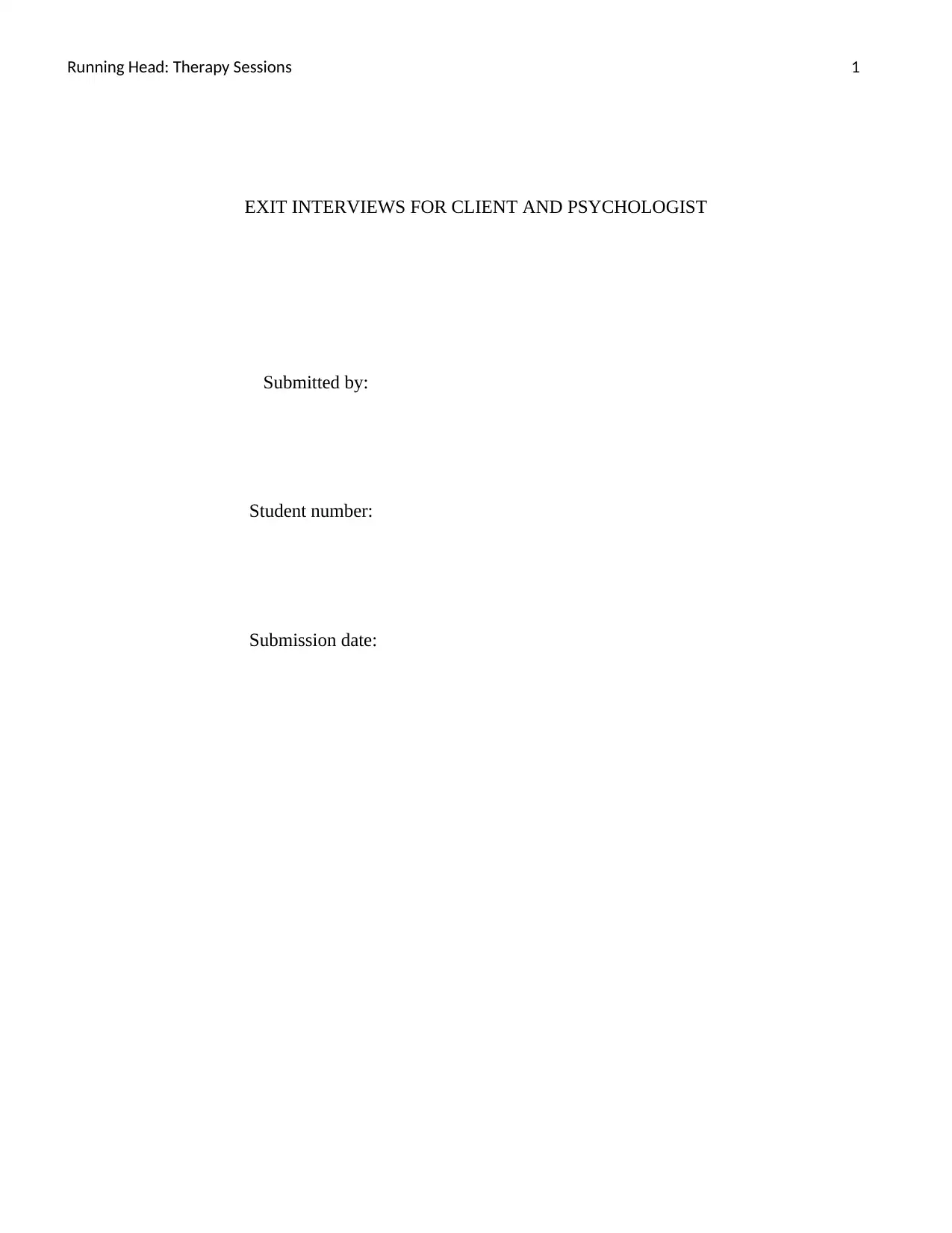
Running Head: Therapy Sessions 1
EXIT INTERVIEWS FOR CLIENT AND PSYCHOLOGIST
Submitted by:
Student number:
Submission date:
EXIT INTERVIEWS FOR CLIENT AND PSYCHOLOGIST
Submitted by:
Student number:
Submission date:
Paraphrase This Document
Need a fresh take? Get an instant paraphrase of this document with our AI Paraphraser
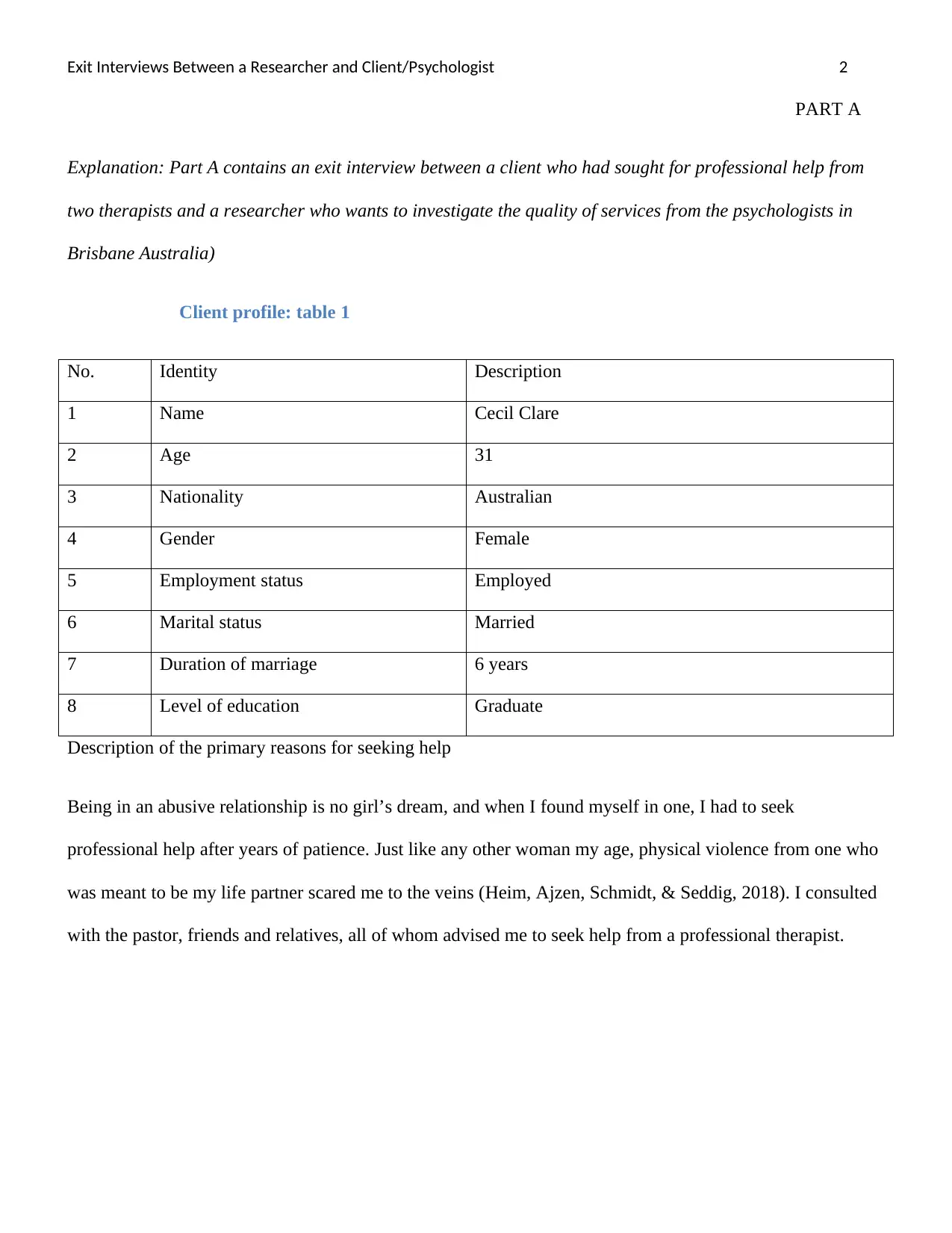
Exit Interviews Between a Researcher and Client/Psychologist 2
PART A
Explanation: Part A contains an exit interview between a client who had sought for professional help from
two therapists and a researcher who wants to investigate the quality of services from the psychologists in
Brisbane Australia)
Client profile: table 1
No. Identity Description
1 Name Cecil Clare
2 Age 31
3 Nationality Australian
4 Gender Female
5 Employment status Employed
6 Marital status Married
7 Duration of marriage 6 years
8 Level of education Graduate
Description of the primary reasons for seeking help
Being in an abusive relationship is no girl’s dream, and when I found myself in one, I had to seek
professional help after years of patience. Just like any other woman my age, physical violence from one who
was meant to be my life partner scared me to the veins (Heim, Ajzen, Schmidt, & Seddig, 2018). I consulted
with the pastor, friends and relatives, all of whom advised me to seek help from a professional therapist.
PART A
Explanation: Part A contains an exit interview between a client who had sought for professional help from
two therapists and a researcher who wants to investigate the quality of services from the psychologists in
Brisbane Australia)
Client profile: table 1
No. Identity Description
1 Name Cecil Clare
2 Age 31
3 Nationality Australian
4 Gender Female
5 Employment status Employed
6 Marital status Married
7 Duration of marriage 6 years
8 Level of education Graduate
Description of the primary reasons for seeking help
Being in an abusive relationship is no girl’s dream, and when I found myself in one, I had to seek
professional help after years of patience. Just like any other woman my age, physical violence from one who
was meant to be my life partner scared me to the veins (Heim, Ajzen, Schmidt, & Seddig, 2018). I consulted
with the pastor, friends and relatives, all of whom advised me to seek help from a professional therapist.
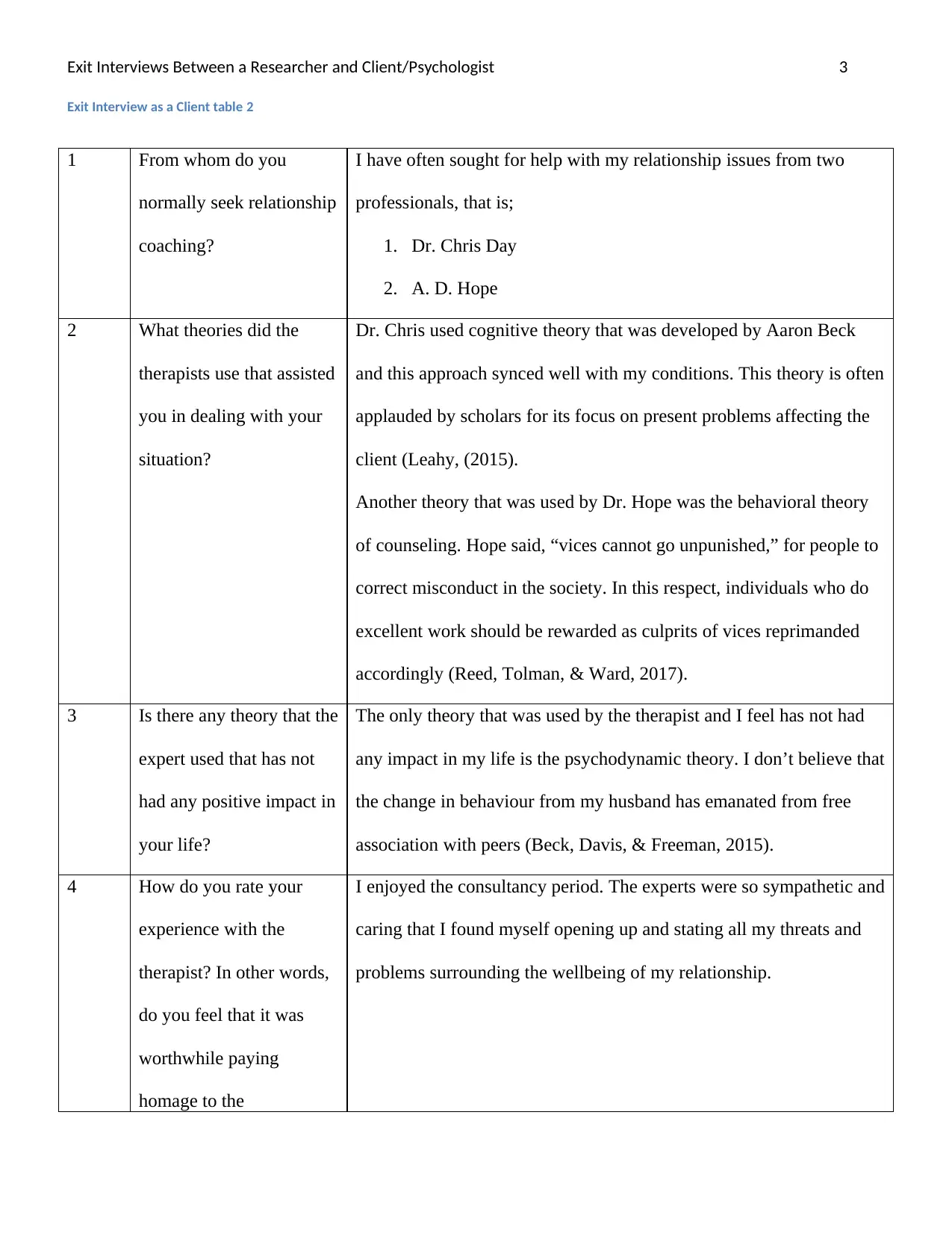
Exit Interviews Between a Researcher and Client/Psychologist 3
Exit Interview as a Client table 2
1 From whom do you
normally seek relationship
coaching?
I have often sought for help with my relationship issues from two
professionals, that is;
1. Dr. Chris Day
2. A. D. Hope
2 What theories did the
therapists use that assisted
you in dealing with your
situation?
Dr. Chris used cognitive theory that was developed by Aaron Beck
and this approach synced well with my conditions. This theory is often
applauded by scholars for its focus on present problems affecting the
client (Leahy, (2015).
Another theory that was used by Dr. Hope was the behavioral theory
of counseling. Hope said, “vices cannot go unpunished,” for people to
correct misconduct in the society. In this respect, individuals who do
excellent work should be rewarded as culprits of vices reprimanded
accordingly (Reed, Tolman, & Ward, 2017).
3 Is there any theory that the
expert used that has not
had any positive impact in
your life?
The only theory that was used by the therapist and I feel has not had
any impact in my life is the psychodynamic theory. I don’t believe that
the change in behaviour from my husband has emanated from free
association with peers (Beck, Davis, & Freeman, 2015).
4 How do you rate your
experience with the
therapist? In other words,
do you feel that it was
worthwhile paying
homage to the
I enjoyed the consultancy period. The experts were so sympathetic and
caring that I found myself opening up and stating all my threats and
problems surrounding the wellbeing of my relationship.
Exit Interview as a Client table 2
1 From whom do you
normally seek relationship
coaching?
I have often sought for help with my relationship issues from two
professionals, that is;
1. Dr. Chris Day
2. A. D. Hope
2 What theories did the
therapists use that assisted
you in dealing with your
situation?
Dr. Chris used cognitive theory that was developed by Aaron Beck
and this approach synced well with my conditions. This theory is often
applauded by scholars for its focus on present problems affecting the
client (Leahy, (2015).
Another theory that was used by Dr. Hope was the behavioral theory
of counseling. Hope said, “vices cannot go unpunished,” for people to
correct misconduct in the society. In this respect, individuals who do
excellent work should be rewarded as culprits of vices reprimanded
accordingly (Reed, Tolman, & Ward, 2017).
3 Is there any theory that the
expert used that has not
had any positive impact in
your life?
The only theory that was used by the therapist and I feel has not had
any impact in my life is the psychodynamic theory. I don’t believe that
the change in behaviour from my husband has emanated from free
association with peers (Beck, Davis, & Freeman, 2015).
4 How do you rate your
experience with the
therapist? In other words,
do you feel that it was
worthwhile paying
homage to the
I enjoyed the consultancy period. The experts were so sympathetic and
caring that I found myself opening up and stating all my threats and
problems surrounding the wellbeing of my relationship.
⊘ This is a preview!⊘
Do you want full access?
Subscribe today to unlock all pages.

Trusted by 1+ million students worldwide
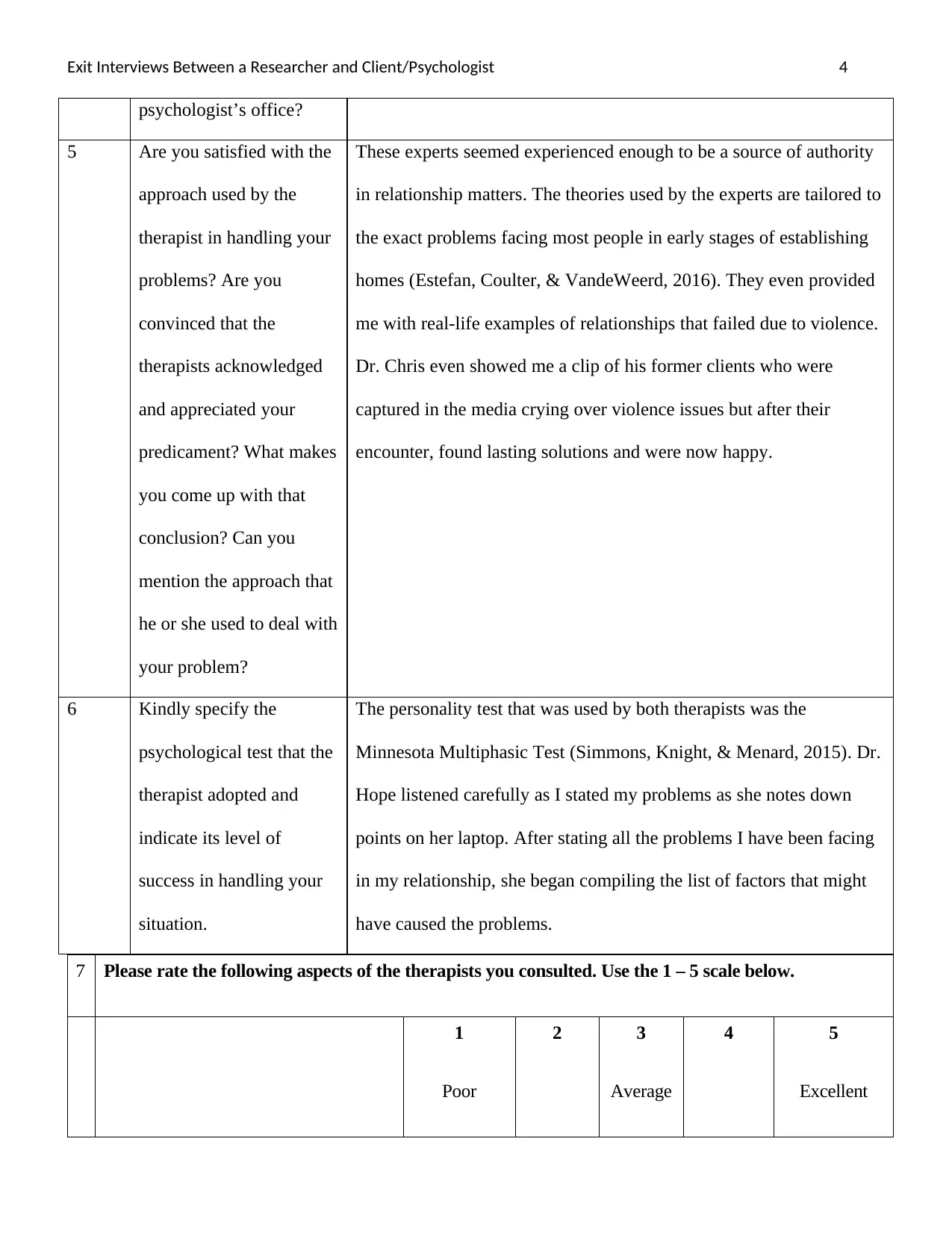
Exit Interviews Between a Researcher and Client/Psychologist 4
psychologist’s office?
5 Are you satisfied with the
approach used by the
therapist in handling your
problems? Are you
convinced that the
therapists acknowledged
and appreciated your
predicament? What makes
you come up with that
conclusion? Can you
mention the approach that
he or she used to deal with
your problem?
These experts seemed experienced enough to be a source of authority
in relationship matters. The theories used by the experts are tailored to
the exact problems facing most people in early stages of establishing
homes (Estefan, Coulter, & VandeWeerd, 2016). They even provided
me with real-life examples of relationships that failed due to violence.
Dr. Chris even showed me a clip of his former clients who were
captured in the media crying over violence issues but after their
encounter, found lasting solutions and were now happy.
6 Kindly specify the
psychological test that the
therapist adopted and
indicate its level of
success in handling your
situation.
The personality test that was used by both therapists was the
Minnesota Multiphasic Test (Simmons, Knight, & Menard, 2015). Dr.
Hope listened carefully as I stated my problems as she notes down
points on her laptop. After stating all the problems I have been facing
in my relationship, she began compiling the list of factors that might
have caused the problems.
7 Please rate the following aspects of the therapists you consulted. Use the 1 – 5 scale below.
1
Poor
2 3
Average
4 5
Excellent
psychologist’s office?
5 Are you satisfied with the
approach used by the
therapist in handling your
problems? Are you
convinced that the
therapists acknowledged
and appreciated your
predicament? What makes
you come up with that
conclusion? Can you
mention the approach that
he or she used to deal with
your problem?
These experts seemed experienced enough to be a source of authority
in relationship matters. The theories used by the experts are tailored to
the exact problems facing most people in early stages of establishing
homes (Estefan, Coulter, & VandeWeerd, 2016). They even provided
me with real-life examples of relationships that failed due to violence.
Dr. Chris even showed me a clip of his former clients who were
captured in the media crying over violence issues but after their
encounter, found lasting solutions and were now happy.
6 Kindly specify the
psychological test that the
therapist adopted and
indicate its level of
success in handling your
situation.
The personality test that was used by both therapists was the
Minnesota Multiphasic Test (Simmons, Knight, & Menard, 2015). Dr.
Hope listened carefully as I stated my problems as she notes down
points on her laptop. After stating all the problems I have been facing
in my relationship, she began compiling the list of factors that might
have caused the problems.
7 Please rate the following aspects of the therapists you consulted. Use the 1 – 5 scale below.
1
Poor
2 3
Average
4 5
Excellent
Paraphrase This Document
Need a fresh take? Get an instant paraphrase of this document with our AI Paraphraser
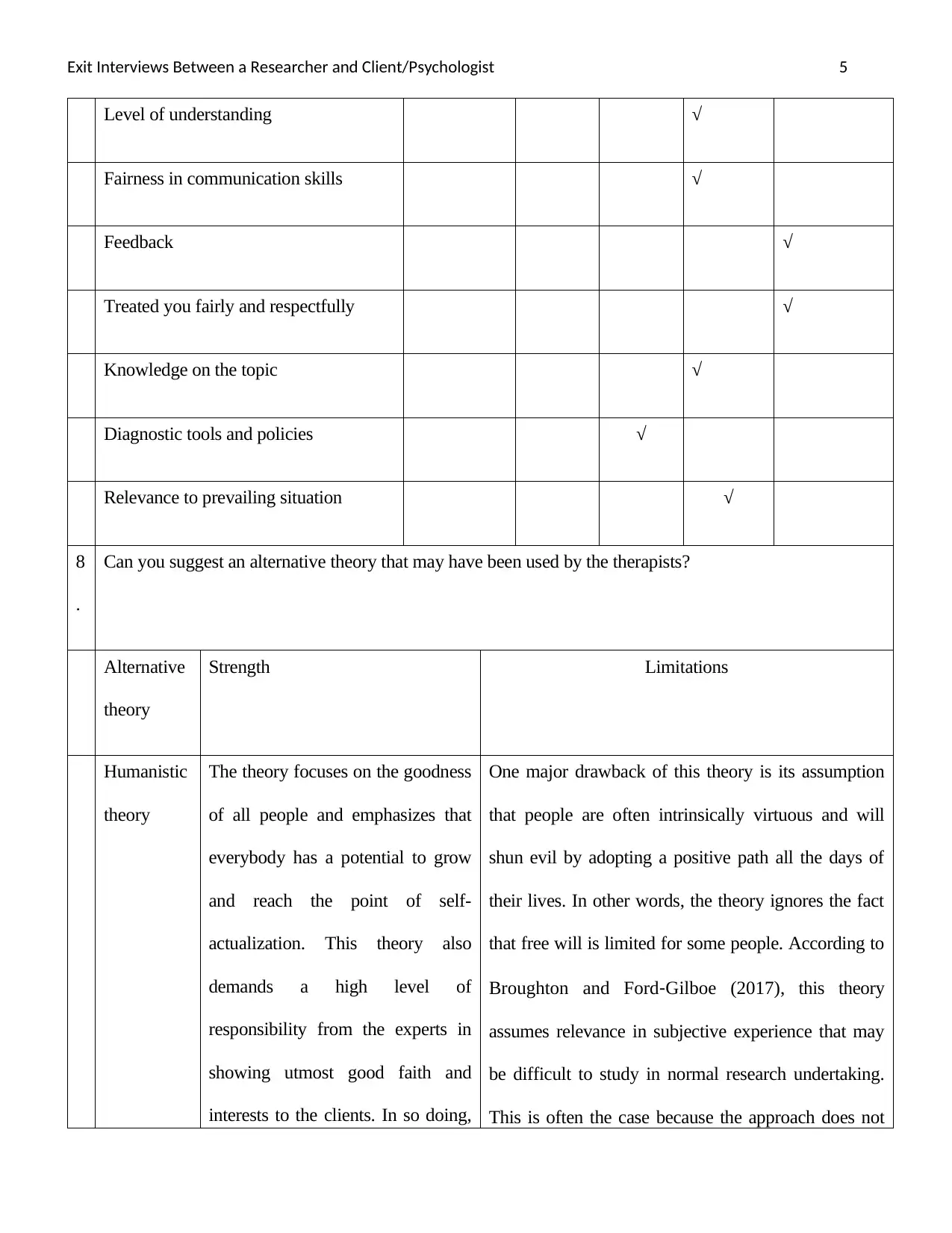
Exit Interviews Between a Researcher and Client/Psychologist 5
Level of understanding √
Fairness in communication skills √
Feedback √
Treated you fairly and respectfully √
Knowledge on the topic √
Diagnostic tools and policies √
Relevance to prevailing situation √
8
.
Can you suggest an alternative theory that may have been used by the therapists?
Alternative
theory
Strength Limitations
Humanistic
theory
The theory focuses on the goodness
of all people and emphasizes that
everybody has a potential to grow
and reach the point of self-
actualization. This theory also
demands a high level of
responsibility from the experts in
showing utmost good faith and
interests to the clients. In so doing,
One major drawback of this theory is its assumption
that people are often intrinsically virtuous and will
shun evil by adopting a positive path all the days of
their lives. In other words, the theory ignores the fact
that free will is limited for some people. According to
Broughton and Ford‐Gilboe (2017), this theory
assumes relevance in subjective experience that may
be difficult to study in normal research undertaking.
This is often the case because the approach does not
Level of understanding √
Fairness in communication skills √
Feedback √
Treated you fairly and respectfully √
Knowledge on the topic √
Diagnostic tools and policies √
Relevance to prevailing situation √
8
.
Can you suggest an alternative theory that may have been used by the therapists?
Alternative
theory
Strength Limitations
Humanistic
theory
The theory focuses on the goodness
of all people and emphasizes that
everybody has a potential to grow
and reach the point of self-
actualization. This theory also
demands a high level of
responsibility from the experts in
showing utmost good faith and
interests to the clients. In so doing,
One major drawback of this theory is its assumption
that people are often intrinsically virtuous and will
shun evil by adopting a positive path all the days of
their lives. In other words, the theory ignores the fact
that free will is limited for some people. According to
Broughton and Ford‐Gilboe (2017), this theory
assumes relevance in subjective experience that may
be difficult to study in normal research undertaking.
This is often the case because the approach does not
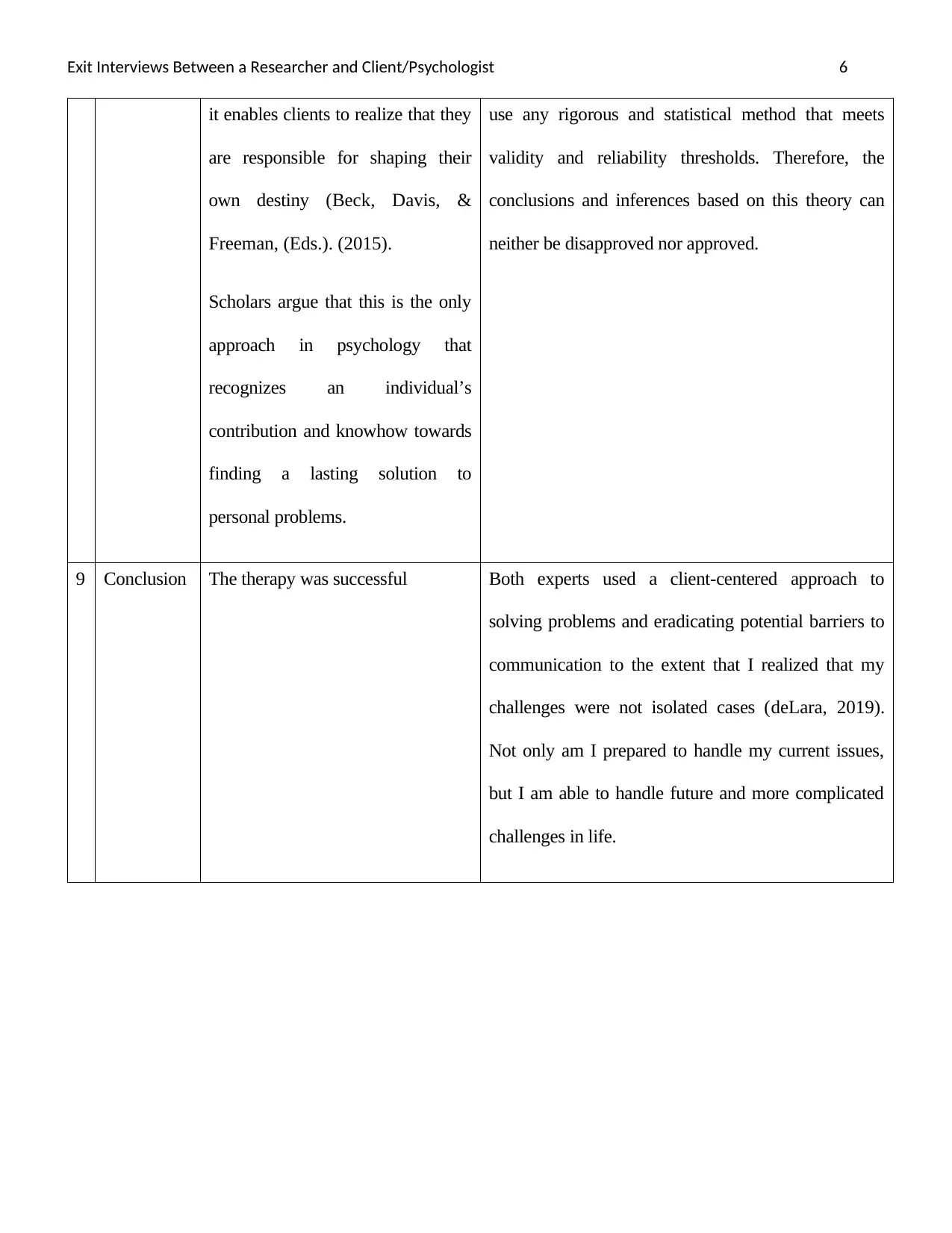
Exit Interviews Between a Researcher and Client/Psychologist 6
it enables clients to realize that they
are responsible for shaping their
own destiny (Beck, Davis, &
Freeman, (Eds.). (2015).
Scholars argue that this is the only
approach in psychology that
recognizes an individual’s
contribution and knowhow towards
finding a lasting solution to
personal problems.
use any rigorous and statistical method that meets
validity and reliability thresholds. Therefore, the
conclusions and inferences based on this theory can
neither be disapproved nor approved.
9 Conclusion The therapy was successful Both experts used a client-centered approach to
solving problems and eradicating potential barriers to
communication to the extent that I realized that my
challenges were not isolated cases (deLara, 2019).
Not only am I prepared to handle my current issues,
but I am able to handle future and more complicated
challenges in life.
it enables clients to realize that they
are responsible for shaping their
own destiny (Beck, Davis, &
Freeman, (Eds.). (2015).
Scholars argue that this is the only
approach in psychology that
recognizes an individual’s
contribution and knowhow towards
finding a lasting solution to
personal problems.
use any rigorous and statistical method that meets
validity and reliability thresholds. Therefore, the
conclusions and inferences based on this theory can
neither be disapproved nor approved.
9 Conclusion The therapy was successful Both experts used a client-centered approach to
solving problems and eradicating potential barriers to
communication to the extent that I realized that my
challenges were not isolated cases (deLara, 2019).
Not only am I prepared to handle my current issues,
but I am able to handle future and more complicated
challenges in life.
⊘ This is a preview!⊘
Do you want full access?
Subscribe today to unlock all pages.

Trusted by 1+ million students worldwide
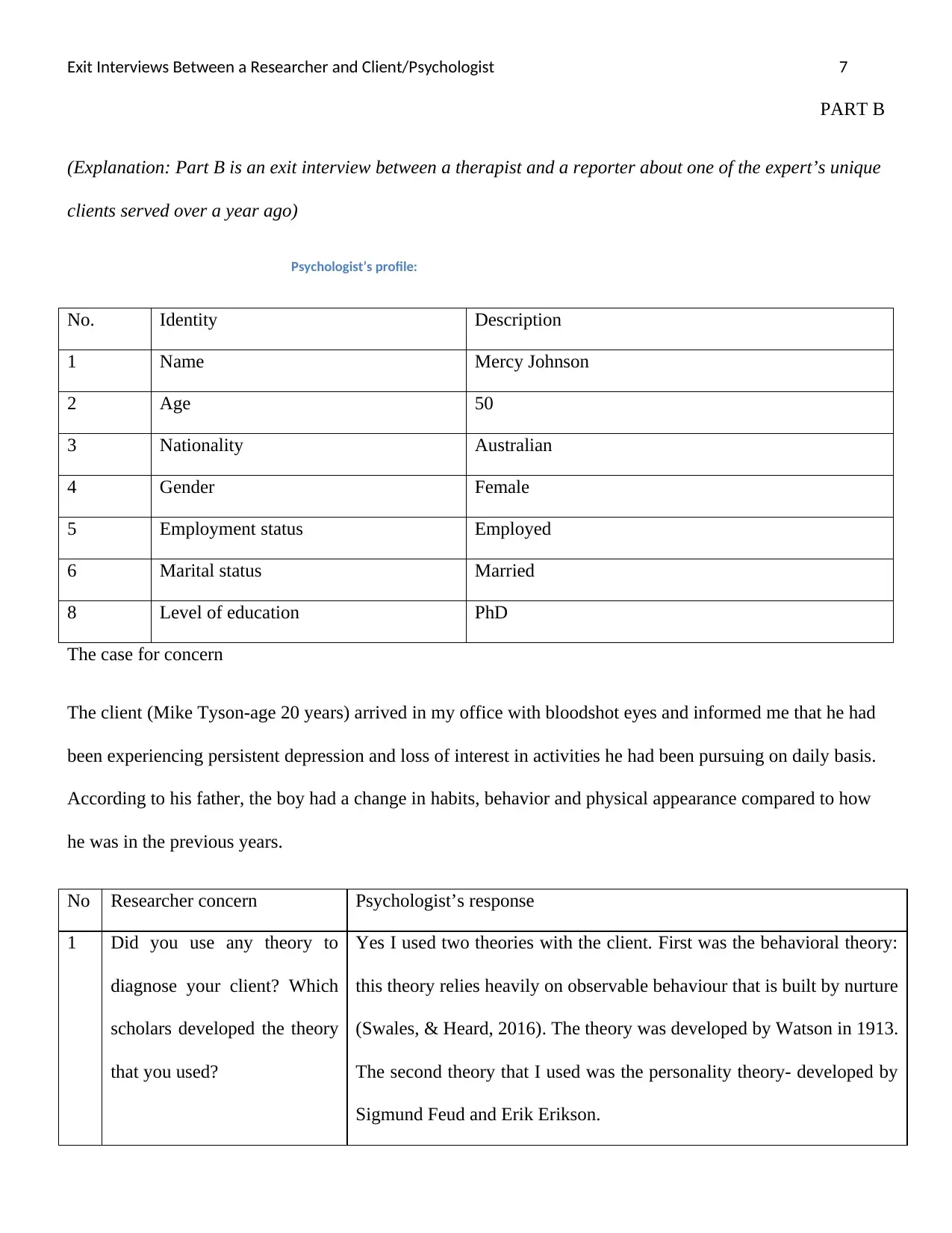
Exit Interviews Between a Researcher and Client/Psychologist 7
PART B
(Explanation: Part B is an exit interview between a therapist and a reporter about one of the expert’s unique
clients served over a year ago)
Psychologist’s profile:
No. Identity Description
1 Name Mercy Johnson
2 Age 50
3 Nationality Australian
4 Gender Female
5 Employment status Employed
6 Marital status Married
8 Level of education PhD
The case for concern
The client (Mike Tyson-age 20 years) arrived in my office with bloodshot eyes and informed me that he had
been experiencing persistent depression and loss of interest in activities he had been pursuing on daily basis.
According to his father, the boy had a change in habits, behavior and physical appearance compared to how
he was in the previous years.
No Researcher concern Psychologist’s response
1 Did you use any theory to
diagnose your client? Which
scholars developed the theory
that you used?
Yes I used two theories with the client. First was the behavioral theory:
this theory relies heavily on observable behaviour that is built by nurture
(Swales, & Heard, 2016). The theory was developed by Watson in 1913.
The second theory that I used was the personality theory- developed by
Sigmund Feud and Erik Erikson.
PART B
(Explanation: Part B is an exit interview between a therapist and a reporter about one of the expert’s unique
clients served over a year ago)
Psychologist’s profile:
No. Identity Description
1 Name Mercy Johnson
2 Age 50
3 Nationality Australian
4 Gender Female
5 Employment status Employed
6 Marital status Married
8 Level of education PhD
The case for concern
The client (Mike Tyson-age 20 years) arrived in my office with bloodshot eyes and informed me that he had
been experiencing persistent depression and loss of interest in activities he had been pursuing on daily basis.
According to his father, the boy had a change in habits, behavior and physical appearance compared to how
he was in the previous years.
No Researcher concern Psychologist’s response
1 Did you use any theory to
diagnose your client? Which
scholars developed the theory
that you used?
Yes I used two theories with the client. First was the behavioral theory:
this theory relies heavily on observable behaviour that is built by nurture
(Swales, & Heard, 2016). The theory was developed by Watson in 1913.
The second theory that I used was the personality theory- developed by
Sigmund Feud and Erik Erikson.
Paraphrase This Document
Need a fresh take? Get an instant paraphrase of this document with our AI Paraphraser
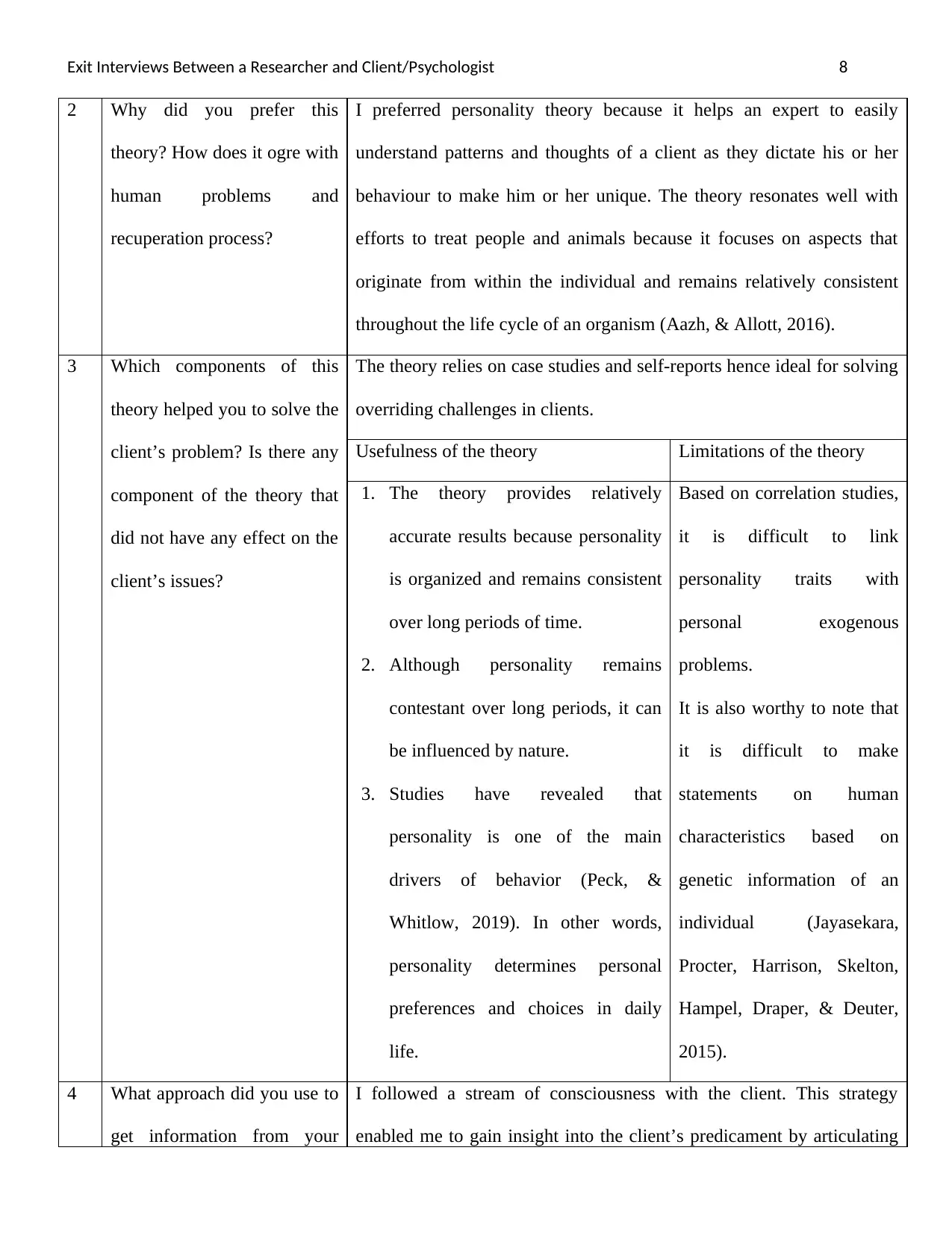
Exit Interviews Between a Researcher and Client/Psychologist 8
2 Why did you prefer this
theory? How does it ogre with
human problems and
recuperation process?
I preferred personality theory because it helps an expert to easily
understand patterns and thoughts of a client as they dictate his or her
behaviour to make him or her unique. The theory resonates well with
efforts to treat people and animals because it focuses on aspects that
originate from within the individual and remains relatively consistent
throughout the life cycle of an organism (Aazh, & Allott, 2016).
3 Which components of this
theory helped you to solve the
client’s problem? Is there any
component of the theory that
did not have any effect on the
client’s issues?
The theory relies on case studies and self-reports hence ideal for solving
overriding challenges in clients.
Usefulness of the theory Limitations of the theory
1. The theory provides relatively
accurate results because personality
is organized and remains consistent
over long periods of time.
2. Although personality remains
contestant over long periods, it can
be influenced by nature.
3. Studies have revealed that
personality is one of the main
drivers of behavior (Peck, &
Whitlow, 2019). In other words,
personality determines personal
preferences and choices in daily
life.
Based on correlation studies,
it is difficult to link
personality traits with
personal exogenous
problems.
It is also worthy to note that
it is difficult to make
statements on human
characteristics based on
genetic information of an
individual (Jayasekara,
Procter, Harrison, Skelton,
Hampel, Draper, & Deuter,
2015).
4 What approach did you use to
get information from your
I followed a stream of consciousness with the client. This strategy
enabled me to gain insight into the client’s predicament by articulating
2 Why did you prefer this
theory? How does it ogre with
human problems and
recuperation process?
I preferred personality theory because it helps an expert to easily
understand patterns and thoughts of a client as they dictate his or her
behaviour to make him or her unique. The theory resonates well with
efforts to treat people and animals because it focuses on aspects that
originate from within the individual and remains relatively consistent
throughout the life cycle of an organism (Aazh, & Allott, 2016).
3 Which components of this
theory helped you to solve the
client’s problem? Is there any
component of the theory that
did not have any effect on the
client’s issues?
The theory relies on case studies and self-reports hence ideal for solving
overriding challenges in clients.
Usefulness of the theory Limitations of the theory
1. The theory provides relatively
accurate results because personality
is organized and remains consistent
over long periods of time.
2. Although personality remains
contestant over long periods, it can
be influenced by nature.
3. Studies have revealed that
personality is one of the main
drivers of behavior (Peck, &
Whitlow, 2019). In other words,
personality determines personal
preferences and choices in daily
life.
Based on correlation studies,
it is difficult to link
personality traits with
personal exogenous
problems.
It is also worthy to note that
it is difficult to make
statements on human
characteristics based on
genetic information of an
individual (Jayasekara,
Procter, Harrison, Skelton,
Hampel, Draper, & Deuter,
2015).
4 What approach did you use to
get information from your
I followed a stream of consciousness with the client. This strategy
enabled me to gain insight into the client’s predicament by articulating
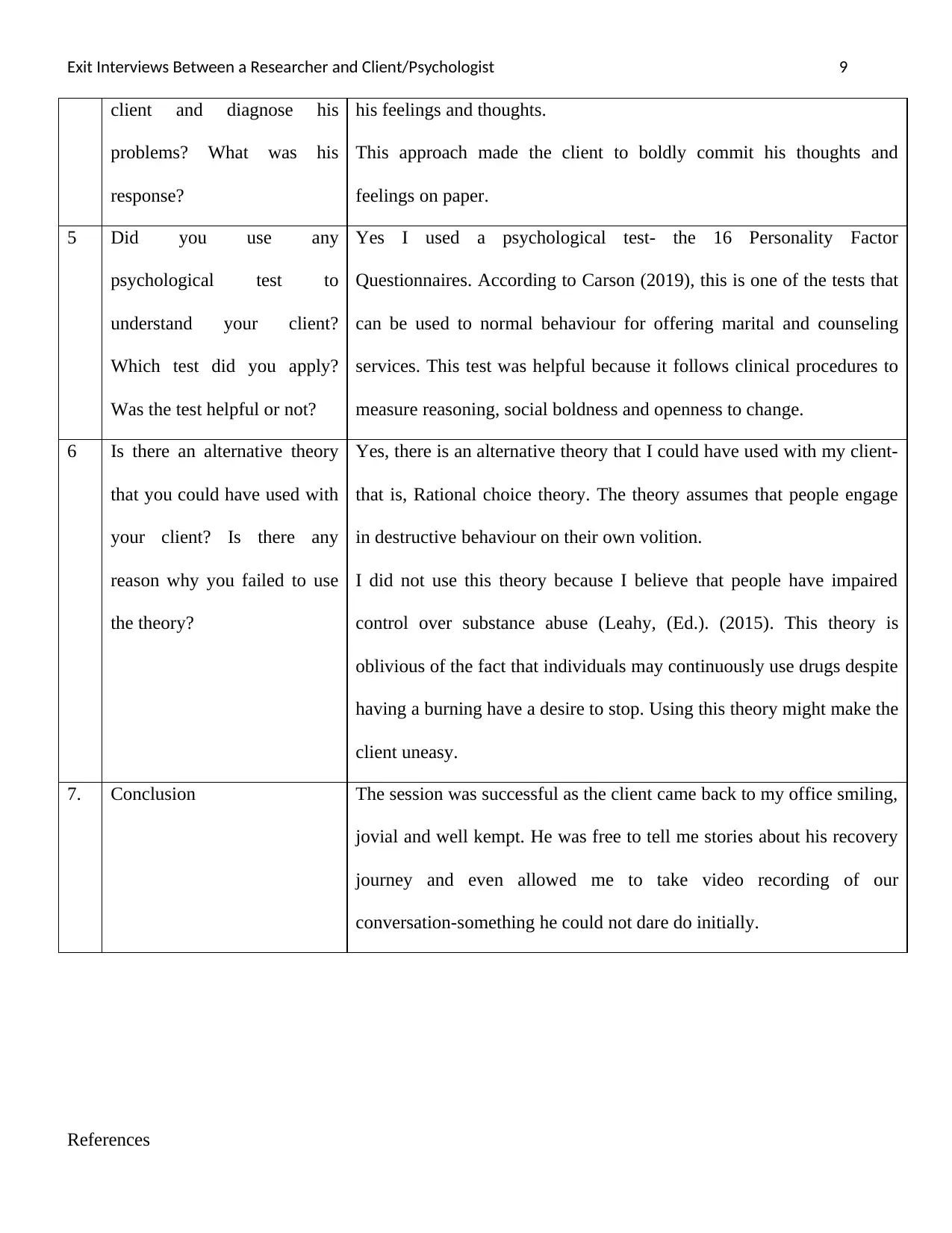
Exit Interviews Between a Researcher and Client/Psychologist 9
client and diagnose his
problems? What was his
response?
his feelings and thoughts.
This approach made the client to boldly commit his thoughts and
feelings on paper.
5 Did you use any
psychological test to
understand your client?
Which test did you apply?
Was the test helpful or not?
Yes I used a psychological test- the 16 Personality Factor
Questionnaires. According to Carson (2019), this is one of the tests that
can be used to normal behaviour for offering marital and counseling
services. This test was helpful because it follows clinical procedures to
measure reasoning, social boldness and openness to change.
6 Is there an alternative theory
that you could have used with
your client? Is there any
reason why you failed to use
the theory?
Yes, there is an alternative theory that I could have used with my client-
that is, Rational choice theory. The theory assumes that people engage
in destructive behaviour on their own volition.
I did not use this theory because I believe that people have impaired
control over substance abuse (Leahy, (Ed.). (2015). This theory is
oblivious of the fact that individuals may continuously use drugs despite
having a burning have a desire to stop. Using this theory might make the
client uneasy.
7. Conclusion The session was successful as the client came back to my office smiling,
jovial and well kempt. He was free to tell me stories about his recovery
journey and even allowed me to take video recording of our
conversation-something he could not dare do initially.
References
client and diagnose his
problems? What was his
response?
his feelings and thoughts.
This approach made the client to boldly commit his thoughts and
feelings on paper.
5 Did you use any
psychological test to
understand your client?
Which test did you apply?
Was the test helpful or not?
Yes I used a psychological test- the 16 Personality Factor
Questionnaires. According to Carson (2019), this is one of the tests that
can be used to normal behaviour for offering marital and counseling
services. This test was helpful because it follows clinical procedures to
measure reasoning, social boldness and openness to change.
6 Is there an alternative theory
that you could have used with
your client? Is there any
reason why you failed to use
the theory?
Yes, there is an alternative theory that I could have used with my client-
that is, Rational choice theory. The theory assumes that people engage
in destructive behaviour on their own volition.
I did not use this theory because I believe that people have impaired
control over substance abuse (Leahy, (Ed.). (2015). This theory is
oblivious of the fact that individuals may continuously use drugs despite
having a burning have a desire to stop. Using this theory might make the
client uneasy.
7. Conclusion The session was successful as the client came back to my office smiling,
jovial and well kempt. He was free to tell me stories about his recovery
journey and even allowed me to take video recording of our
conversation-something he could not dare do initially.
References
⊘ This is a preview!⊘
Do you want full access?
Subscribe today to unlock all pages.

Trusted by 1+ million students worldwide
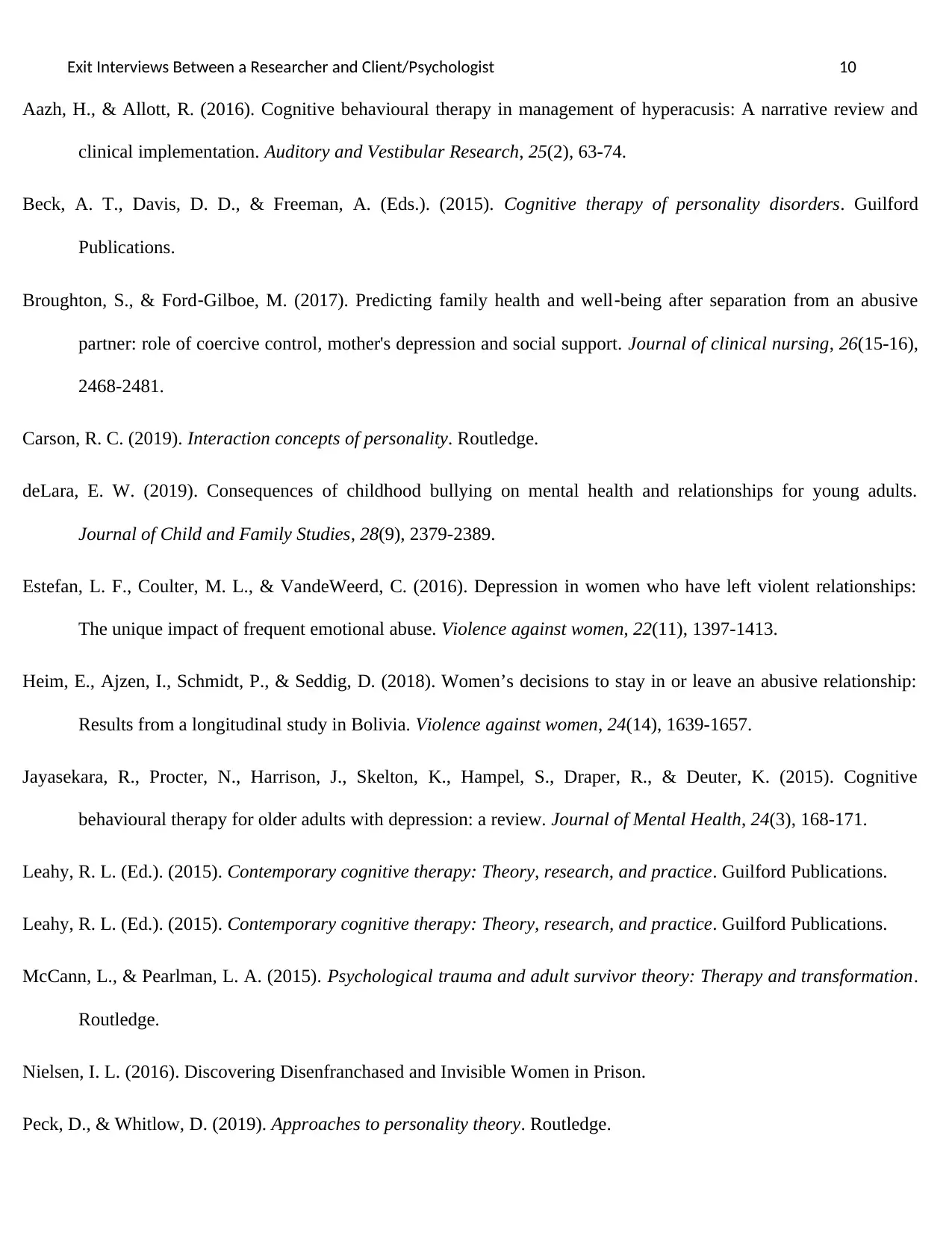
Exit Interviews Between a Researcher and Client/Psychologist 10
Aazh, H., & Allott, R. (2016). Cognitive behavioural therapy in management of hyperacusis: A narrative review and
clinical implementation. Auditory and Vestibular Research, 25(2), 63-74.
Beck, A. T., Davis, D. D., & Freeman, A. (Eds.). (2015). Cognitive therapy of personality disorders. Guilford
Publications.
Broughton, S., & Ford‐Gilboe, M. (2017). Predicting family health and well‐being after separation from an abusive
partner: role of coercive control, mother's depression and social support. Journal of clinical nursing, 26(15-16),
2468-2481.
Carson, R. C. (2019). Interaction concepts of personality. Routledge.
deLara, E. W. (2019). Consequences of childhood bullying on mental health and relationships for young adults.
Journal of Child and Family Studies, 28(9), 2379-2389.
Estefan, L. F., Coulter, M. L., & VandeWeerd, C. (2016). Depression in women who have left violent relationships:
The unique impact of frequent emotional abuse. Violence against women, 22(11), 1397-1413.
Heim, E., Ajzen, I., Schmidt, P., & Seddig, D. (2018). Women’s decisions to stay in or leave an abusive relationship:
Results from a longitudinal study in Bolivia. Violence against women, 24(14), 1639-1657.
Jayasekara, R., Procter, N., Harrison, J., Skelton, K., Hampel, S., Draper, R., & Deuter, K. (2015). Cognitive
behavioural therapy for older adults with depression: a review. Journal of Mental Health, 24(3), 168-171.
Leahy, R. L. (Ed.). (2015). Contemporary cognitive therapy: Theory, research, and practice. Guilford Publications.
Leahy, R. L. (Ed.). (2015). Contemporary cognitive therapy: Theory, research, and practice. Guilford Publications.
McCann, L., & Pearlman, L. A. (2015). Psychological trauma and adult survivor theory: Therapy and transformation.
Routledge.
Nielsen, I. L. (2016). Discovering Disenfranchased and Invisible Women in Prison.
Peck, D., & Whitlow, D. (2019). Approaches to personality theory. Routledge.
Aazh, H., & Allott, R. (2016). Cognitive behavioural therapy in management of hyperacusis: A narrative review and
clinical implementation. Auditory and Vestibular Research, 25(2), 63-74.
Beck, A. T., Davis, D. D., & Freeman, A. (Eds.). (2015). Cognitive therapy of personality disorders. Guilford
Publications.
Broughton, S., & Ford‐Gilboe, M. (2017). Predicting family health and well‐being after separation from an abusive
partner: role of coercive control, mother's depression and social support. Journal of clinical nursing, 26(15-16),
2468-2481.
Carson, R. C. (2019). Interaction concepts of personality. Routledge.
deLara, E. W. (2019). Consequences of childhood bullying on mental health and relationships for young adults.
Journal of Child and Family Studies, 28(9), 2379-2389.
Estefan, L. F., Coulter, M. L., & VandeWeerd, C. (2016). Depression in women who have left violent relationships:
The unique impact of frequent emotional abuse. Violence against women, 22(11), 1397-1413.
Heim, E., Ajzen, I., Schmidt, P., & Seddig, D. (2018). Women’s decisions to stay in or leave an abusive relationship:
Results from a longitudinal study in Bolivia. Violence against women, 24(14), 1639-1657.
Jayasekara, R., Procter, N., Harrison, J., Skelton, K., Hampel, S., Draper, R., & Deuter, K. (2015). Cognitive
behavioural therapy for older adults with depression: a review. Journal of Mental Health, 24(3), 168-171.
Leahy, R. L. (Ed.). (2015). Contemporary cognitive therapy: Theory, research, and practice. Guilford Publications.
Leahy, R. L. (Ed.). (2015). Contemporary cognitive therapy: Theory, research, and practice. Guilford Publications.
McCann, L., & Pearlman, L. A. (2015). Psychological trauma and adult survivor theory: Therapy and transformation.
Routledge.
Nielsen, I. L. (2016). Discovering Disenfranchased and Invisible Women in Prison.
Peck, D., & Whitlow, D. (2019). Approaches to personality theory. Routledge.
Paraphrase This Document
Need a fresh take? Get an instant paraphrase of this document with our AI Paraphraser
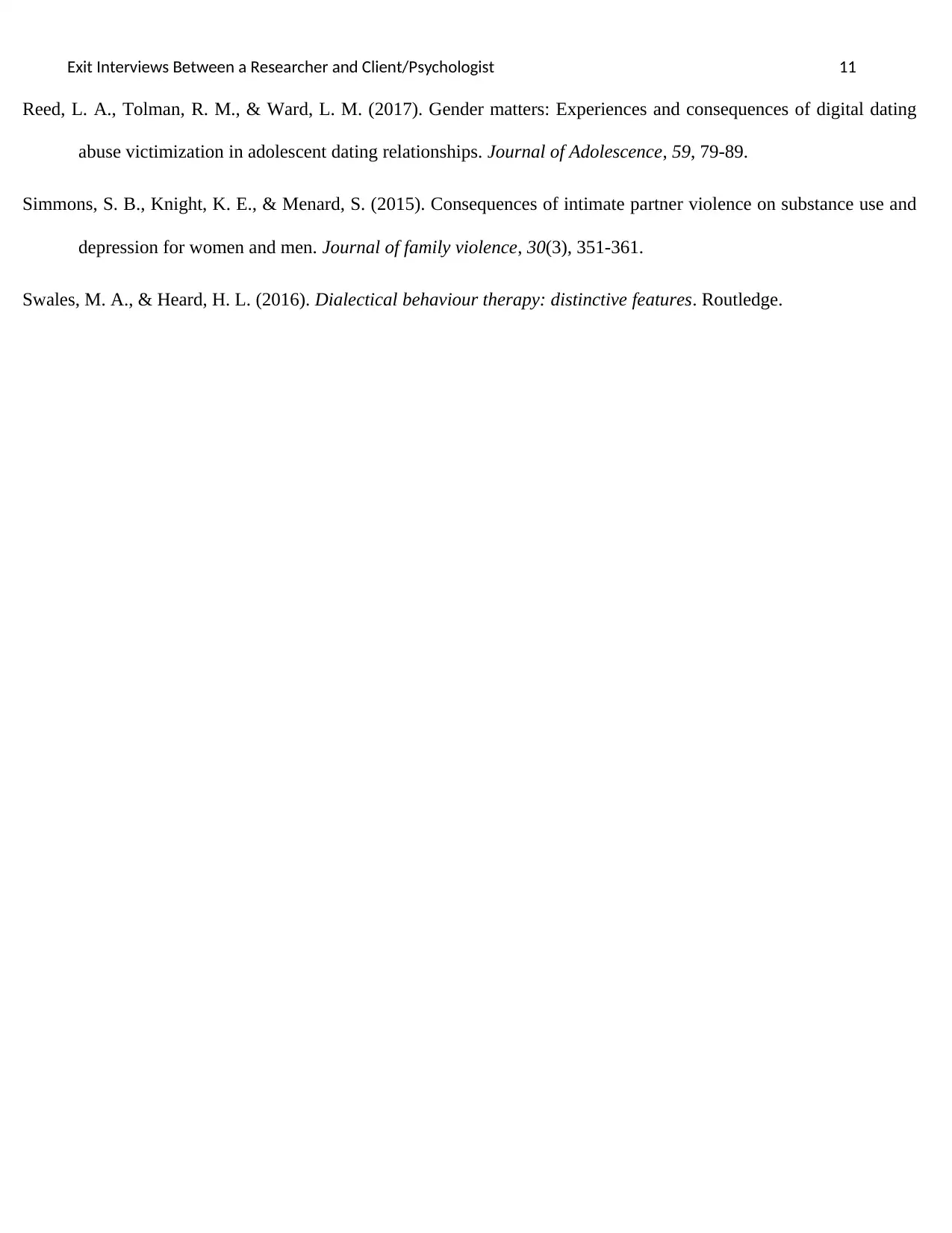
Exit Interviews Between a Researcher and Client/Psychologist 11
Reed, L. A., Tolman, R. M., & Ward, L. M. (2017). Gender matters: Experiences and consequences of digital dating
abuse victimization in adolescent dating relationships. Journal of Adolescence, 59, 79-89.
Simmons, S. B., Knight, K. E., & Menard, S. (2015). Consequences of intimate partner violence on substance use and
depression for women and men. Journal of family violence, 30(3), 351-361.
Swales, M. A., & Heard, H. L. (2016). Dialectical behaviour therapy: distinctive features. Routledge.
Reed, L. A., Tolman, R. M., & Ward, L. M. (2017). Gender matters: Experiences and consequences of digital dating
abuse victimization in adolescent dating relationships. Journal of Adolescence, 59, 79-89.
Simmons, S. B., Knight, K. E., & Menard, S. (2015). Consequences of intimate partner violence on substance use and
depression for women and men. Journal of family violence, 30(3), 351-361.
Swales, M. A., & Heard, H. L. (2016). Dialectical behaviour therapy: distinctive features. Routledge.
1 out of 11
Related Documents
Your All-in-One AI-Powered Toolkit for Academic Success.
+13062052269
info@desklib.com
Available 24*7 on WhatsApp / Email
![[object Object]](/_next/static/media/star-bottom.7253800d.svg)
Unlock your academic potential
Copyright © 2020–2026 A2Z Services. All Rights Reserved. Developed and managed by ZUCOL.
![Interview Report: Insights into a Psychology Career, [University Name]](/_next/image/?url=https%3A%2F%2Fdesklib.com%2Fmedia%2Fimages%2Fzr%2F69a9316b2c224c118408ed3eb4cfca70.jpg&w=256&q=75)

